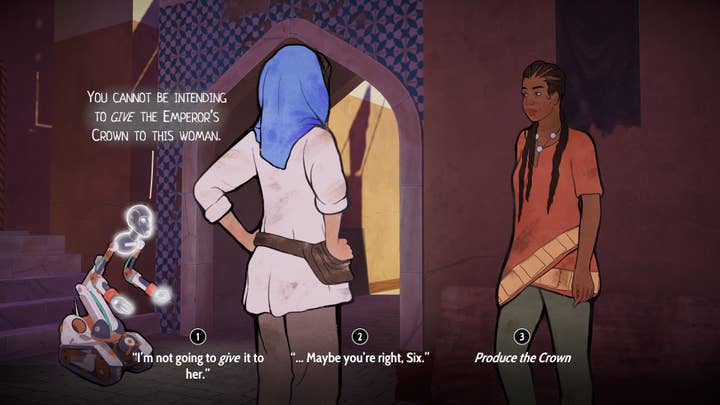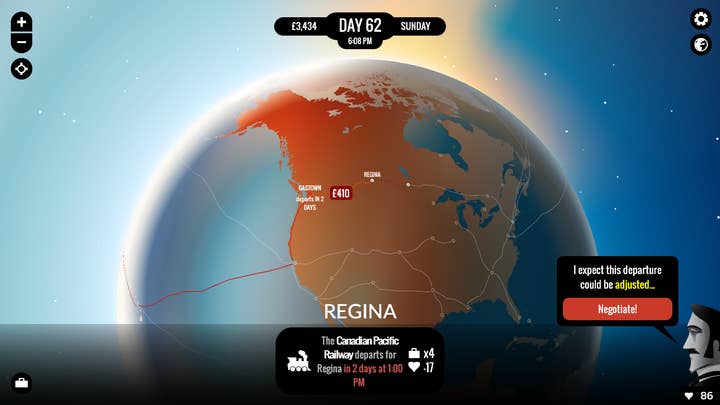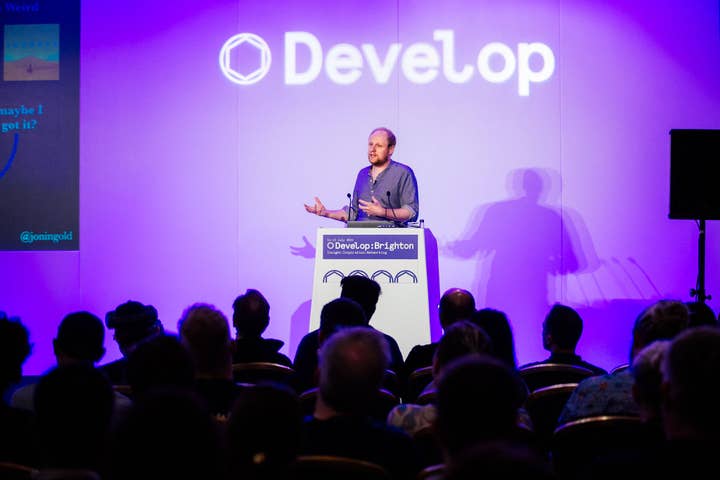Inkle’s Jon Ingold: "The point of narrative is to turn your brain on"
Develop keynote tackled writing games that can be replayed with increased pleasure, and why AI is not the answer
Sign up for the GI Daily here to get the biggest news straight to your inbox
Games are inherently designed to be replayed, from the 'one more go' mentality of the arcades to the persistent loops of modern live service games. However, what makes a game replayable from a design perspective can often be diametrically opposed to narrative.
"As a narrative person, I'm not interested in compulsion loops," said Inkle co-founder and narrative director Jon Ingold during his Develop Brighton keynote last week. "I'm not interested in attention sinks, these are all things which make people turn their brains off, and the point of narrative is to turn your brain on."
Inkle is known for its highly replayable narrative-focused games such as 80 Days, Heaven’s Vault, and Overboard. In fact, the latter was purposefully designed so that each playthrough is short, encouraging players to try it again.
But, as Ingold puts it, "narrative doesn't rely on loops," instead relying on setup and payoff, one-off special events and a few surprises – much of which can’t be played and replayed by default. So how does Inkle craft replayable narratives for its games?
"Everyone who banks on AI content is going to lose – you cannot build real estate in a swamp"
Ingold told Develop attendees he couldn't offer a bulletproof, bullet-pointed manifesto because what works for Inkle may not necessarily apply for another game. He even offered advice that, on the surface, seems counterintuitive – for example, he said: "The secret to replayable narratives is to make them as skippable as possible."
One area he is keen to stress however is that AI is not the solution for richer narratives.
"Everyone who banks on AI content is going to lose – you cannot build real estate in a swamp," he said.
Using AI to generate narratives could, for example, populate lore pickups found in dense open world games where the narrative is essentially a mine where the player is chipping away at to extract lore that they can then discuss with other players.
"But if the lore that you're gathering doesn't connect to the other lore in the game, because AI or some equivalent is just endlessly restocking the mine with meaningless nonsense, you can't theorize about it with yourself or your friends, so it's literally worthless," Ingold observed. "If you fill your diamond mine with sludge, it won't give you more diamonds, it'll give you a mine full of sludge."
Ingold identifies that one of the biggest problems faced by game writers is that they're limited by the constraints of games in the kinds of narrative content they can deliver.
"There are in fact only two forms that narrative content is permitted to take in games: justification (i.e. exposition) and backstory," he explained. "They're also both modes of understanding, it’s all cognitive. That's why game writers are allowed them because in the past, we had to go to designers and programmers and say, can we please put some writing in the game, and they say ‘What's it for?’ But once you do understand it, then the narrative is spent, and so is the game. You can't reset your understanding of something."

One method for making narratives richer and more complex is to make them deliberately ambiguous and nebulous – a model that’s become the signature style of FromSoftware games, although Ingold cautions this can risk frustrating players to the point where they just abandon it.
"Not every game needs to be an ambiguous mysterious world of unknowable truths to be interesting. Sometimes you just want to entertain people."
He cited the late science fiction and fantasy Gene Wolfe who, while known for his dense and allusive prose, was also quoted as saying, "My definition of good literature is that which can be read by an educated reader and re-read with increased pleasure."
"What he means is literature is the quality of fiction, not the genre of fiction," Ingold explained. "It's always possible to make something that has more to it than it first appears, something which is entertaining, sure, but is not simply entertaining, something which can be re-read with increased pleasure, not diminished, compromised pleasure. That's the challenge that he's throwing down to science fiction writers. And I think that's also the challenge that he's throwing down for us."
"I can enjoy narrative content repeatedly because of the connection. I can't do the same Sudoku twice"
This does not mean good game writing has to have deep, intricate, and intellectual plots or themes. Ingold listed Bill & Ted’s Excellent Adventure, Blade Runner, and Muppet Treasure Island as his most rewatched films.
"The important critical thing about Bill & Ted is not about the plot, the heart and soul of the movie is Kenau Reeves. We're not watching it for the time travel twists, we're watching this guy's reaction to the time travel twists. When we rewatch a movie, it's the reactions that we're watching because they give us the sense of connection that gives us a sense of being there in that world in that moment. That is what the whole of storytelling actually is really about, everything else is just a vehicle for those moments."
Applying this principle to games then, Ingold argued that the most important form of replayable storytelling comes from banter, or what’s also referred to in games as barks, which applies to any line of dialogue that’s a response to the gameplay, such as audio cues in fighting games to the background chitchat in Naughty Dog’s games or Eidos Montreal's Guardians of the Galaxy.
"Those are the bits of writing which are dynamic and characterful and highly memorable in a way that cutscenes and lore pickups generally speaking just aren't. Banter is embedded into what the player is doing, it's plentiful, it’s contextual, it’s reactive, and it also demands good pacing. That last point is actually really key because banter is about synchronising the narrative and the play via synchronising the player and the protagonist."
Indeed, banter is essentially what forms the narrative in Inkle’s games, without ever using cutscenes, audio logs or written notes, leaving just the dialogue between characters to provide enough storytelling nuggets to tell the story.
"All of our games are fundamentally argument simulators, so in 80 Days, you're challenged to travel around the world so that Passepartout and Fhogg can piss each other off. In Heaven's Vault, you explore an ancient 4,000-year-old civilization so that the pedantic robot and the grumpy scientist can annoy each other. That's why you play them."

What also makes these interactions believable is also through the realism of activity that allows player and protagonist to be in sync, which means avoiding overtly gamey mechanics like skill trees or power-ups, or at least not attempting to provide a ludicrous narrative justification.
For example, Heaven's Vault’s translation system requires choosing words from a draggable menu into an abstract interface, but because the protagonist Aliya is talking about the answers with her robot Six, it makes it feel like the player really is translating something.
Meanwhile, the studio’s upcoming A Highland Song, while appearing as a 2.5D platformer, is much more grounded narratively. Moira heals not by picking up items but by sitting down to rest, which improves when she’s resting under shelter.
""Not every game needs to be an ambiguous mysterious world of unknowable truths to be interesting. Sometimes you just want to entertain people"
Ingold however warned that no amount of good banter or sophisticated writing can solve the replay problem of repetition, which will cause players to stop paying attention. But, he added, this is actually a game design problem rather than a narrative one, with no clear cut solution that applies to every game.
For 80 Days, the solution was that the team had written so much content that it was a deliberate choice to limit the player’s options on the first playthrough before opening up more possible routes in subsequent runs, including ways to reach other destinations faster. Overboard, however, is only set over a single day, which means more likelihood of repeating scenes so the decision was made to allow these to have a fast-forward option.
Heaven's Vault, meanwhile, has a version of new game plus where you have more difficult procedurally-generated translation puzzles but it retains the dictionary of all the words and phrases you learned from the previous playthrough.
"Within all of those cases, you have essentially a really large bank of gameplay, much bigger than we expect any player to see the entirety of, and we kind of draw it down into the game loop every time you play," Ingold explained.
"Which is to say that despite the fact that gameplay is built on loops, and narrative is this progression which can't go backwards over the course of multiple replays, that actually reverses completely because skill is a linear progression that can't go backwards. I can enjoy narrative content repeatedly because of the connection. I can't do the same Sudoku twice."
Ultimately, this is not a call for infinite narrative content, which would be an impossible demand on the writers and a mistake to allow AI to generate.
"To take what Wolfe says, I want games that you can replay with increased pleasure," Ingold concluded. "But we're fine whether players play once, 20, or 100 times. All of these are good so long as people are ending because they're satisfied, not because they're bored."
We spoke to Jon Ingold ahead of his keynote about how Inkle's games have changed over time, and his vision for future narratives.
Sign up for the GI Daily here to get the biggest news straight to your inbox
GamesIndustry.biz is a media partner for Develop Brighton

